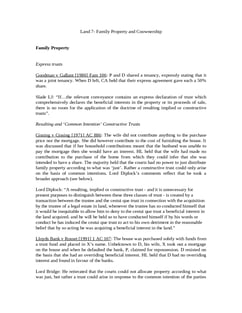Bankway Properties Ltd v Dunsford [2001] 1 WLR 1541
Judgement for the case Bankway Properties Ltd v Dunsford
Defendant was an assured tenant in Plaintiff’s accommodation under a statutory scheme that limited rent increases.
Plaintiff had inserted a rent review clause that allowed rent increases well above market rate (contradicted the statute) and his claim for possession was therefore denied when Plaintiff fell into arrears under the new level of rent.
Arden LJ
This clause was an unlawful contracting out of an act of parliament. Although it was not a sham, “where a question arises whether an agreement is not intended to have the effect stated, but is intended to evade the operation of a statute out of which the parties cannot contract”, it may be a variety of sham.
She asks whether there is, “in substance” an unlawful contracting out.
She says that because the rent review clause (enabling a rise of up to £25k per year) was not used at first opportunity, wasn’t justified at market rent, etc., it was merely a device for forcing the tenant into arrears so as to recover possession.
Since the landlord never expected to receive the rent, and was not produced by bargaining and wasn’t used at the first opportunity, it was not really a rent-payment clause.
Bright: This decision is wrong. In this case the landlord definitely intended to rely on the clause, albeit a clause that is artificial in nature and with a bad motive. It is still a clause for payment of rent. Though the clause may be devious, it is hard to see how it is “contracting out” of a statute, when the statute allowed the tenant and landlord to agree the initial rent.
Pill LJ
He doesn’t use Arden LJ’s approach but says that the clause was inconsistent with the statutory purpose. The statute aimed to make tenancy of this kind more secure, but the clause did precisely the opposite, and was therefore invalid.
He says that in this case Arden LJ’s “contracting out” approach is wrong, since the parties were free to create a different type of lease in the first place: clearly the statute on assured tenancies can be legitimately avoided.
Bright: both approaches are wrong as they use moral judgment as the basis for their decisions, whereas they should pay more attention to the hard-edged principles of property law.
For Further Study on Bankway Properties Ltd v Dunsford

Contract law notes fully updated for recent exams at Oxford and Cambrid...
Need instant answers? Our AI exam tutor is here to help.
Ask questions 🙋 Get answers 📔 It's simple 👁️👄👁️
Our AI is educated by the highest scoring students across all subjects and schools. Join hundreds of your peers today.
Get StartedSimilar Cases
Related Product Samples
These product samples contain the same concepts we cover in this case.
| Contract Law | Exclusion Clauses Notes (21 pages) |
| Land Law | Leases Notes (77 pages) |

 Since 2010, Oxbridge Notes has been a trusted education marketplace, supplying high-quality materials from top achievers at universities like Oxford, Cambridge, LSE, Harvard, and Yale.
Since 2010, Oxbridge Notes has been a trusted education marketplace, supplying high-quality materials from top achievers at universities like Oxford, Cambridge, LSE, Harvard, and Yale.